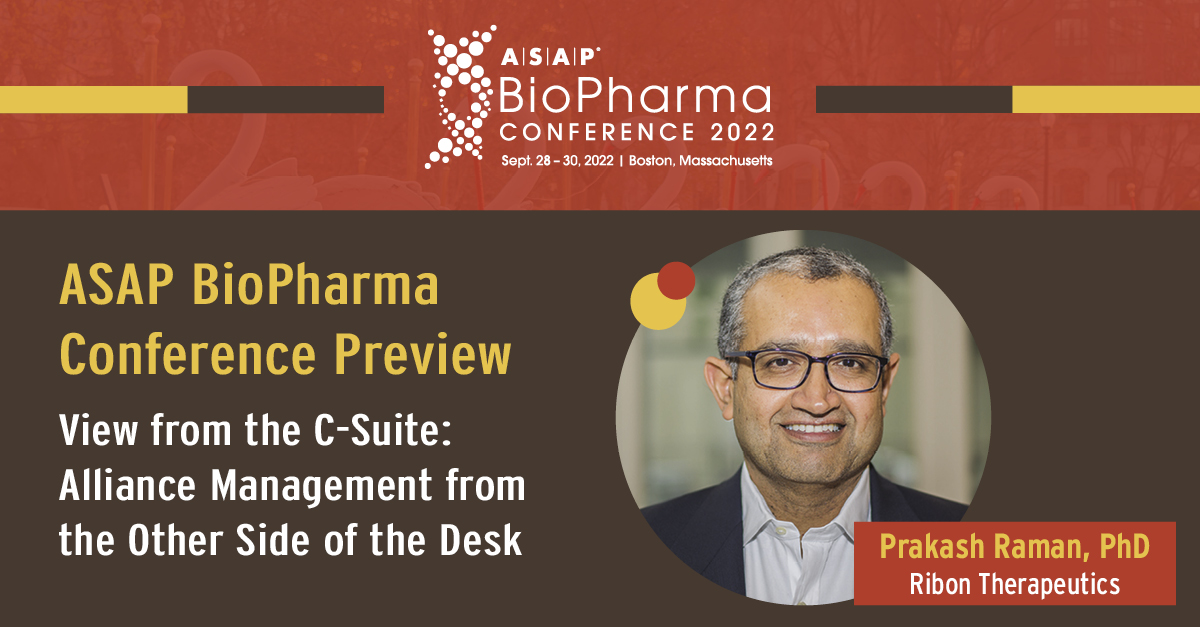View from the C-Suite: Alliance Management from the Other Side of the Desk
| For more information or to register for the BioPharma Conference, click here. |
Alliance managers are starting to occupy more and more CEO chairs, and one of these newly minted company heads is going to share his view of the state of the alliance management profession today as seen from the chief executive’s office at the 2022 ASAP BioPharma Conference next month in Boston.
In his first year as president and CEO of Ribon Therapeutics, Prakash Raman, PhD, is applying a well-rounded perspective shaped by a career in alliance management, business development, and project management roles at Novartis, AstraZeneca, and the life sciences venture capital firm Flagship Pioneering.
High EQ? Alliance Managers and CEOs Can Relate
What elements of his alliance management experience are serving him well as he leads his clinical-stage biotech? CEOs have to engage and mollify a wide variety of stakeholders at any given time, something alliance professionals can relate to.
“He really understands that alliance management professionals need to have a high emotional quotient (EQ). They really have to be tuned in to all the different aspects of relationships spanning the science, business terms, and operational execution,” said Christine Carberry, CSAP, principal of Carberry Consulting, who will be moderating a fireside chat with Raman as part of the final day of the conference’s keynote session. “That’s an area that alliance management professionals know is really important, yet it is one of those areas where it is hard to measure the impact that alliance managers have.”
Alliance Guides Help with Academic Hurdles
Raman brings strong views on how “the people who know the context of the deal” should design “alliance guides,” living documents with rules of engagement and operating principles that provide visibility into the alliance’s affairs. He will also be sharing some tips on how to overcome common barriers in academic alliances, most notably easing the transition of science-oriented researchers at these institutions of higher learning into formal business relationships—or as Carberry summarized, keeping “high scientific integrity aligned with high business integrity.”
And while many alliance managers lament that their CEOs don’t fully understand what they do, Raman may tell the audience of his struggles not to get too far into the weeds. As a former alliance manager, it’s sometimes tempting to jump into the trenches since he knows how day-to-day partnership activities should be managed.
“That’s probably an interesting challenge when you have a CEO who is familiar and has experience in alliance management, and now they’re not in an alliance management role but they know how important it is to the overall success of the company. How do you find that right balance of what decisions to make yourself as a CEO and what decisions should really be made by your alliance management professional or at a team level?” said Carberry.
Train Young Professionals and Biotechs—ASAP!
Raman is also formalizing alliance training within Ribon, and he espouses the importance of senior alliance professionals actively training the next generation. He is also adamant that it shouldn’t just be Big Pharma companies investing in the discipline.
“Even very small companies, if they have a partnership that is critical to their success, you can get a lot of value by being connected to the [ASAP] community,” said Carberry, relaying Raman’s thoughts. “Those resources and being able to network with people who have a lot of experience in that space can really help a startup or small company increase the chances of their collaborations and partnerships being successful.”
Register now for the 2022 ASAP BioPharma Conference to hear Raman’s keynote, and equally important, to network with him and other leaders and senior alliance professionals to gather new ideas on how to advance your partnerships and your career as a whole.

